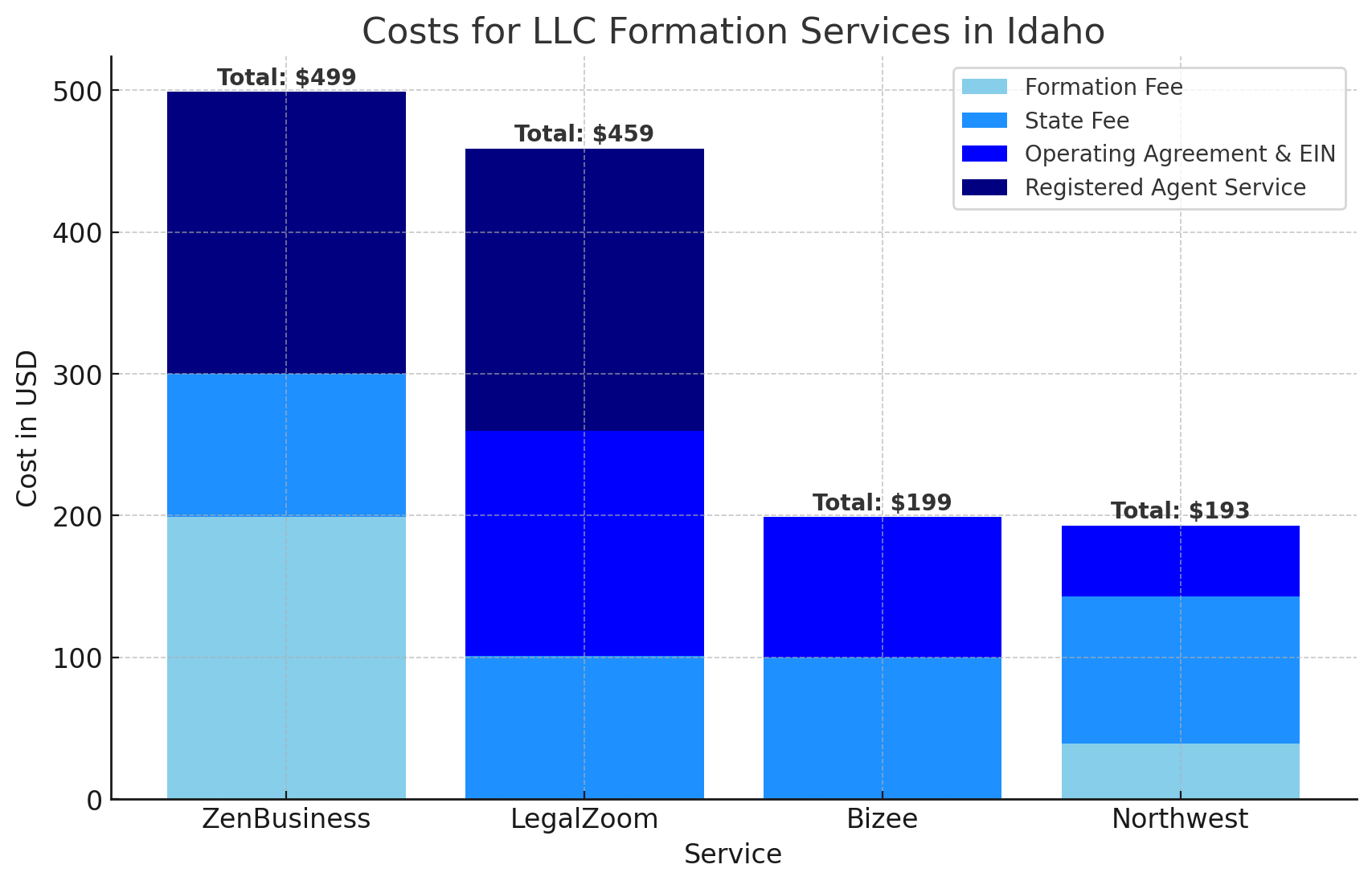If you're planning to launch a business in Idaho, forming a Limited Liability Company (LLC) can be a strategic step towards realizing your entrepreneurial vision. This guide aims to simplify the process of establishing your LLC in Idaho, breaking down each step in a clear and digestible manner.
Whether you're a novice founder or a seasoned business person, this article will navigate you through the essential aspects of Idaho LLC formation.
Options for Forming an LLC in Idaho
- Do-It-Yourself (DIY): Perfect for those who are comfortable with legal procedures and prefer to handle things independently.
Go to the Idaho Secretary of State’s website to set up the LLC and then to the IRS’s website to get your EIN (Employer Identification Number). - Hiring a Lawyer: Ideal for getting personalized legal advice, particularly in complex situations.
- Using a Formation Service: A practical, cost-effective option for many. Prominent services include Bizee, LegalZoom, ZenBusiness, and our recommended choice, Northwest Registered Agent.

Our guide provides clear, expert advice at each stage of your Idaho LLC formation journey.
Steps to Form an LLC in Idaho
- Choose Your LLC’s Name: Your chosen name must be unique in Idaho and include “Limited Liability Company” or its abbreviations.
Complying with Idaho’s naming guidelines is essential. Idaho’s rules for naming LLCs are detailed in Idaho Statute § 30-21-301. - Appoint a Registered Agent: Idaho law requires appointing a registered agent with an Idaho street address to handle your LLC's legal documents.
- File the Certificate of Organization: Submit this key document to the Idaho Secretary of State. It details your LLC’s name, address, registered agent, and management structure. The filing fee is $100.
- Create an Operating Agreement: Though not legally mandated in Idaho, an operating agreement is vital for outlining your LLC's operational and management structures.
- Obtain an Employer Identification Number (EIN): Essential for tax and employment purposes, available through the IRS website.
- Open a Business Bank Account: Distinguish your personal and business finances with a dedicated bank account for your LLC.
- Fund Your LLC: Capitalize your business via personal investments, loans, or other funding sources.
- Ongoing Compliance: File an Annual Report with no fee to maintain your LLC's standing in Idaho.
Establishing Your LLC with Northwest Registered Agent
Northwest Registered Agent simplifies the LLC formation process. By clicking on the button below, you can use our affiliate link
and form your LLC in Idaho for only $39, plus state fees. This exclusive offer includes their registered agent service free for the first year, adding extra value and savings for your new venture.
We get commissions for purchases made through links in this post.
Legal Considerations and Compliance in Idaho
Ensuring compliance with Idaho-specific regulations is critical. Maintain a readily accessible registered agent and file your Annual Report timely to keep your LLC compliant.
Benefits of Forming an LLC in Idaho
An Idaho LLC provides limited liability protection, potential tax advantages, and operational flexibility. Idaho's business-friendly environment offers numerous opportunities for growth across various sectors.
Common Mistakes to Avoid
Common errors include overlooking legal responsibilities or commingling personal and business funds. Stay informed, comply with state laws, and seek professional services when necessary.
Next Steps After Establishing Your LLC
After formation, focus on developing a solid business plan, establishing efficient accounting systems, and marketing your services. Use tools and services for effective business management to ensure success.
Conclusion
Starting an LLC in Idaho offers various pathways, each with distinct benefits. Entrepreneurs can choose DIY, legal aid, or services like Northwest Registered Agent for their efficiency and cost-effectiveness. They streamline the setup process, ensuring a smoother and more reliable establishment of your limited liability company.
Start an LLC in Idaho FAQs
Can you be your own registered agent in Idaho?
Yes, but if you act as your own registered agent in Idaho, your name and address will be publicly listed. You'll need to be available during regular business hours to receive any legal documents in person.
Can I change my registered agent after I start an LLC?
Yes. To change your registered agent in Idaho, use this link. You will need to file a Statement of Change of Registered Agent to the Idaho Secretary of State’s office. Filing is free if you file electronically or $20 if you file manually.
What’s the difference between a member-managed and manager-managed LLC?
If you go for a member-managed LLC, the members (owners) will handle the day-to-day operations. In a manager-managed LLC, members hire managers to run things. These managers take care of tasks such as hiring and firing employees, managing credit and bank accounts, and signing agreements and contracts.
What should be included in an operating agreement?
A personalized operating agreement addresses both the day-to-day and overarching aspects of your company, encompassing everything from member responsibilities to the dissolution of the business. Here are common topics typically included in operating agreements:
- Initial investments
- Profits, losses, and distributions
- Voting rights, decision-making powers, and management
- Transfer of membership interest
- Dissolving the business
Do I need an EIN for my Idaho LLC?
Yes, you need an EIN if your business has employees, is a multi-member LLC, or is taxed as a corporation. Even if your LLC isn't legally obligated to have an EIN, it's advisable. An EIN allows you to open bank accounts, apply for business licenses, and is generally essential for business operations. It also helps keep your Social Security Number (SSN) private during business transactions.